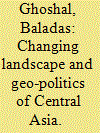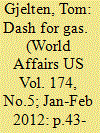| Srl | Item |
| 1 |
ID:
128115


|
|
|
|
|
| Publication |
2013.
|
| Summary/Abstract |
The world may be witnessing a period of growing importance for Central Asia. It is a region where competing systems for international order are fully engages. it many will be the case that what transpires in Central Asia, i.e., competition between, international powers, will shape the future order in the region and indeed the world at large. One need not engage in far reaching geopolitical speculations regarding the future of Central Asia: it is already a political battleground for influence. This is more the sufficient reason to focus on the region to find out the emerging geopolitical trends and their implications for stability and order in the region.
|
|
|
|
|
|
|
|
|
|
|
|
|
|
|
|
| 2 |
ID:
115058


|
|
|
|
|
| Publication |
2012.
|
| Summary/Abstract |
For a fresh perspective on geopolitical trends, look at the world through the lens of the natural gas trade. One of the reasons for Israeli unease with the Arab Spring is that the democratic uprising that took down Hosni Mubarak also brought interruptions in Israel's supply of natural gas, much of which since 2008 has come from Egypt. Wondering about China's new interest in Australia and Qatar? It's about their abundant gas supplies and China's tremendous energy needs. Desperate for signs of cooperation from North Korea? Check out reports that Kim Jong-il may agree to the construction of a natural gas pipeline that would link Russia, Pyongyang, and Seoul. From Asia to the Middle East to North America, a boom in natural gas usage is rearranging international connections, with major repercussions for global politics.
|
|
|
|
|
|
|
|
|
|
|
|
|
|
|
|
| 3 |
ID:
132557


|
|
|
|
|
| Publication |
2014.
|
| Summary/Abstract |
Insofar as Europe's security and cohesion have for decades been premised upon a strong American political and strategic engagement, Washington's intention to "rebalance" to Asia casts a shadow over the sustainability of a stable and coherent geopolitical order on the continent. This article argues that as the United States seeks to rebalance strategically towards the Asia-Pacific region a number of "indigenous" geopolitical trends are becoming increasingly important in Europe: an Anglo-French entente for a "maritime" Europe, a German-French "continental" project of economic and political integration, and Russia's resurgence across Europe's East. The growing prominence of competing geopolitical visions for Europe might even call into question the cohesion and direction of the institutional expressions of the U.S.- engineered Western order in Europe, namely the Atlantic Alliance and the European Union. Increasing geopolitical and institutional contestation, we contend, pose a number of challenges for both U.S. interests and European security.
|
|
|
|
|
|
|
|
|
|
|
|
|
|
|
|
| 4 |
ID:
130896


|
|
|
|
|
| Publication |
2014.
|
| Summary/Abstract |
I WOULD LIKE to point to three recent geopolitical trends which are part of European integration. The first of them is decreasing population strength, a demographic trend which betrayed itself after the 1990s in all East European, especially the Baltic, countries: all of them are steadily losing the younger population groups. Second, there are strong and strengthening interest groups oriented at certain regions: in the Baltic countries, for example, the groups oriented at Scandinavian countries oppose those looking at Brussels and Germany yet their control over corresponding countries is partial. New players on the East European scene, China in the first place, are responsible for the third trend caused by Eurasian integration. Belarus is one of the best examples: it is a member of the Customs Union with Russia and of many other integration structures inside the Union State of Russia and Belarus.
|
|
|
|
|
|
|
|
|
|
|
|
|
|
|
|